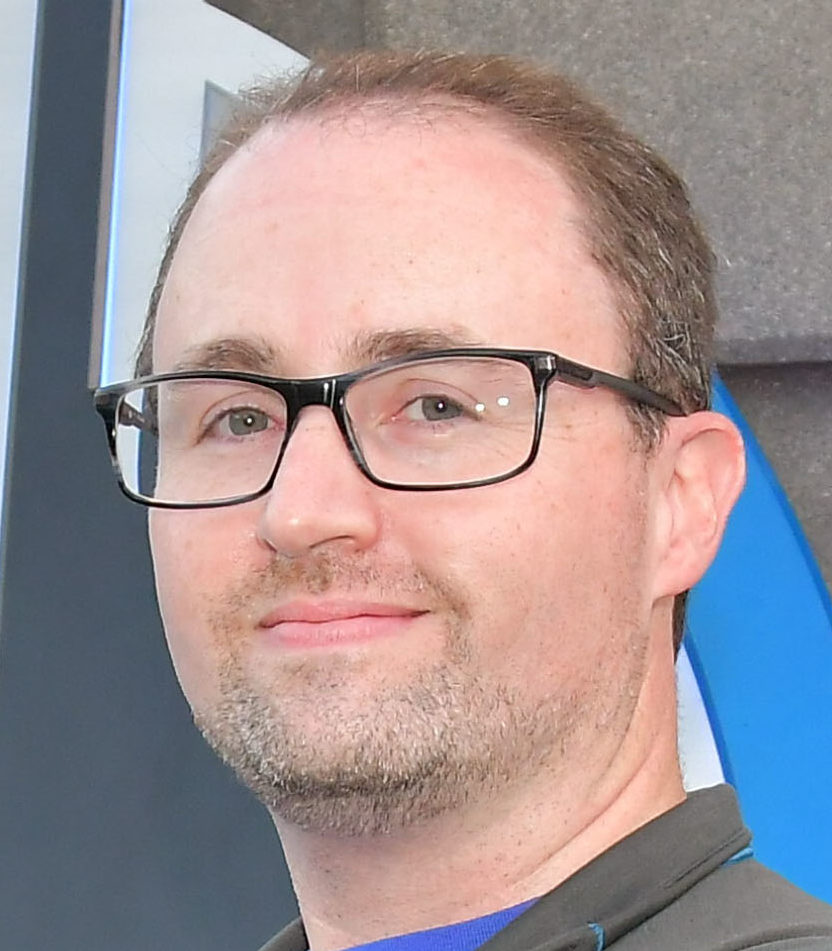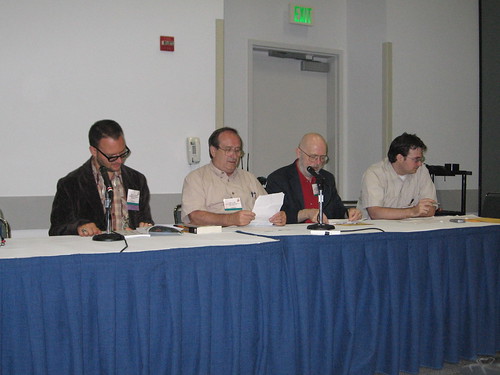Only two weeks since our last podcast show, we’ve got a new one! We’re on fire here, and hopefully this breakneck pace will continue.
July 2008
We Like Stuff – Episode 4
Somehow I forgot to mention it, but! We Like Stuff episode 4 has been up for a little while now:
http://www.welikestuff.net/2008/07/we-like-stuff-episode-4/
Hopefully we’ll be back on a more regular production schedule from here on out.
iPod Touch: Better than cargo pants
Way back in 2005, I made sure to jokingly praise my cargo pants for being “perhaps the most underappreciated tech accessory on the market today” after going to a conference and noting how much stuff I could haul in them. For every conference between then and now, I wore cargos daily and got similar use.
But then this year at ALA I simply didn’t need them – thanks to my iPod touch, a device I’m completely enamored with. It represents a nice compromise for someone like myself who wants an iPhone but doesn’t want to pay the high monthly contract fee for one.
The Touch is missing two main features of the iPhone: internet connectivity via cell network, and GPS. The Touch does get internet access via wifi. I spend about 80% of my day within wifi coverage, thanks to the Chapel Hill campus and municipal networks, so that’s one problem overcome. And I really don’t have a huge desire for ubiquitous GPS access.
For conferencing it let me carry in one compact device: my calendar/schedule, my e-mail, my web access, my address book, and some basic notes. I was able to leave my laptop in the hotel room, which was extremely nice.
This is a wonderful little device, and I highly recommend it.
ALA 2008: Twitter’s killer app
I’m now convinced that Twitter’s killer app is conferences and other large scale in-person gatherings.
In Anaheim we organized meetups, kept tabs on concurrent sessions we couldn’t all attend, helped each other navigate the buildings, pointed out overlooked sessions, discussed sessions while they were going on, and even played a game.
I’ve conversed with a lot of the people I saw at ALA via twitter for a while now, and it was wonderful to put faces with names! And having a pre-formed group of people to coordinate with took a lot of the stress out of the conference for me. I spent less time wandering aimlessly and more time being productive.
The coolest example, for sheer scale, was when we organized a 10 person meetup at Disneyland on the fly, converging from tons of different locations, using nothing but twitter.
If twitter can get their stability issues under control before everybody jumps ship (which could unfortunately be any day now), it’ll be a wonderful thing. None of the replacement options out there seem to be quite as right for this kind of environment. So I’m crossing my fingers that we’ll be using twitter at ALA ’09.
ALA 2008: What is the future of face-to-face reference?
This was another panel presentation, each member spoke for a bit about the topic. I neglected to write down the presenters’ names, unfortunately, but did get their home institutions.
UC Merced’s setup was particularly interesting to me – as a new university, they were able to build their library’s policies and functions from the ground up. They do not have librarians regularly on the reference desk, instead relying on student workers to refer patrons to specialists as needed and emphasizing contact via digital means whenever possible. We’re moving a bit toward this model at UNC, and I liked seeing what a reference department could look like after a full transition to that model.
Appalachian State University has been experimenting with providing service via ActiveWorlds. I’m not sure that virtual worlds are the place to go just yet – I don’t think there’s enough concentrated population of our users there for it to be worth the effort of widespread implementation. But, that said, I’m glad that somebody is experimenting with it. They emphasized that we can’t create and abandon a service point – we must be fully committed to new projects.
Ohio University has experimented with reference service via video chat. Kiosks were placed in the stacks and connected to librarians via skype. They went unused. The kiosk was then moved near the main entrance, where it has generated about 1-2 questions per day. Being close to in-person access points limits its usefulness. They may try to come up with a better location later. The presenter pointed out that video chat is a new technology, just hitting the mainstream, and users may not be ready to use it in a non-personal fashion. This turned out to be a proof of concept project, and not a full success. It’s a very good example of how to develop and revise a new service method, and I’m very glad that ASU was so willing to share about something less than fully successful.
ALA 2008: SF & Fantasy: Info rights of the individual panel
This panel drew me in just on the basis of the author particpants’ pure geek factor:
Cory Doctorow (of BoingBoing.net and many novels)
Eric Flint (of the 1632 series)
Vernor Vinge (of the seminal True Names and many Hugo awards)
Brandon Sanderson (of the yet-to-be-finished conclusion to Wheel of Time)
Each author spoke on where they think info rights will be going in the near future. Some highlights:
Vinge:
- Once stated that pre-2000 years may later be viewed as a dark age due to a lack of digitization and a ‘disinclination toward books’
- Now he thinks even that was too optimistic – will today’s data be caught and retrievable in the future?
- Emphasized the importance of open standards.
Sanderson:
- It’s much harder than in the past to be a layman scientist – much specialization required
- Instead, we can explore new ideas and rules via science fiction and fantasy
- What ideals are dealt with in a fantasy world can be a time capsule of the writer and society’s attitudes.
- We should teach students to love information first, above all else, and then they’ll seek it out on their own.
Flint:
- Like Vinge, sees a dark age brewing
- Unlike Vinge, Flint blames it more on our current copyright system
- 70 years + life is far too long, he favors a 40 years or life (whichever is longer) term instead.
- People want both e-books and print books, and use them for different things. Publishers should provide both in a package.
- The electronic era provides a dangerous excuse for wiping out fair use, we need to be vigilant to preserve it
Doctorow:
- The internet is best at facilitating collective action
- We build culture online around arbitrary things
- Again the possibility of a dark age if information isn’t shared
- The internet is a “perfect enlightenment machine”
- Copyright laws’ importance cannot be overemphasized – “the future of civilization is at stake”
There was a Q&A session afterward, which I felt was a bit of a wasted opportunity. I think a lot of people were there only to see Doctorow and overlooked the input of the other panelists. But each author was very generous with their time and stuck around to do signings afterward! Meeting each of them was a thrill for me.
ALA 2008: Social Software Showcase
I got more out of the BIGWIG Social Software Showcase than any other session at ALA this year.
Regular sessions at ALA have to be planned so far in advance (often a year) that they are very rarely about cutting edge topics. The showcase sidesteps that issue nicely by basing itself on the relatively new ‘unconference’ idea: a bunch of people show up and talk about what they’re interested in. I believe the agenda of what topics would be focused on wasn’t finalized until a week or two before the event!
Each topic had a featured coordinator, who claimed a table or area of the room. People then rotated around, dropping in and out of discussions as they liked. Offhand I can remember a partial list of topics, the ones I gravitated to: APIs, facebook, and streaming video. The format lends itself nicely to a more conversational approach than most conference events – everyone had something to share, and and asking questions flowed much more naturally into the setting.
The room was sized to seat about 75 people, and more than 100 showed up! I have a feeling this will be an even bigger deal next year in Chicago.
ALA 2008: Distance Learning Panel
My presentation is online here: http://www.hiddenpeanuts.com/ALA08.ppt
It may not mean much without my accompanying narration, but I wanted to put it up anyway.
The panel went well! We had some great speakers and the audience was really engaged and asking questions. I came away with a much deeper realization about how important adapting to distance learning environments is to the future of our profession.
Lauren Pressley, one of the panel’s organizers, posted a few notes about my talk: http://laurenpressley.com/library/?p=544

